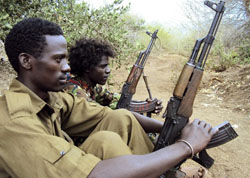Last week, the Ethiopian government tried to force private Kenyan broadcaster Nation Television (NTV) to drop a four-part exclusive report on separatist rebels in southern Ethiopia. NTV aired the first two parts of “Inside Rebel Territory: Rag-Tag Fighters of the Oromo Liberation Front,” which led Ethiopia’s ambassador to Kenya to accuse the Nation Media Group of giving a platform to a terrorist organization, the daily Nation reported. The Oromo Liberation Front (OLF), whose Web site is among several authorities block in Ethiopia, is fighting for greater autonomy for the Oromos, the largest ethnic group in the south of the vast Horn of Africa nation.
“Clearly, officials at the Ethiopian Embassy did not want NTV to air this program. We repeatedly explained to them that this is not possible,” Linus Kaikai, NTV’s managing editor of broadcast news told me today. The Kenyan Foreign Affairs Ministry was also involved in attempting to get the station to drop the story, he said. “No demands have been agreed to,” Kaikai added, saying that the final two parts will air tonight and Tuesday.
The Ethiopian administration, whose leaders were once guerilla fighters allied with the OLF, has sought to censor international media outlets’ coverage of rebel groups. In 2008, authorities accused Qatar-based satellite network Al-Jazeera of “direct and indirect assistance to terrorist organizations” after the station aired an exclusive report on the separatist Ogaden National Liberation Front (ONLF), in southeastern Ethiopia. Al-Jazeera continued to air the program. In 2007, Ethiopian authorities detained three New York Times journalists for five days for reporting on the ONLF.
Local independent journalists who have reported on rebel groups have landed in prison on various criminal charges, including publication or distribution of “false news likely to incite violence” or “membership in a terrorist organization.” In one case, three journalists, Garuma Bekele, Tesfaye Deressa, and Solomon Nemera of the defunct Oromo-language weekly Urji, spent four years in prison over an article challenging official claims about the killing of three alleged OLF members by government forces. Numerous state-employed journalists perceived to have sympathies for the OLF have also been thrown into prison on spurious accusations, including former Ethiopian Television News Director Dhabessa Wakjira.
On top of all that, Ethiopia recently enacted draconian anti-terror legislation, which criminalizes any reporting the government deems favorable to groups and causes it labels as “terrorist.” In other words, reporting the activities or statements of such groups could be interpreted as glorifying or aiding their causes. An Ethiopian reporter, who spoke on condition of anonymity for fear of government reprisal, told me there was no public government reaction to the NTV controversy, and most local media did not report it. Another one said independent coverage of such stories was difficult without a public statement from the government. “You cannot initiate [such] stories if there’s no government reaction, else you run the risk of being labeled as someone who’s promoting their movement,” he said.
